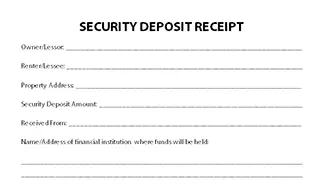Earnest money deposit rental
The security deposit is paid by a tenant up-front to cover any default in the lease, including damage, whereas a buyer puts up an earnest money deposit at the time of the offer to purchase, to be forfeited in the event the buyer does not perform. Security Deposit — Money deposited by or for the tenant with the landlord, to be held by the landlord for the following purposes: The security deposit is not regarded as liquidated damages, but rather is a fund held in trust for the tenant that the landlord can use to offset damages caused by the tenant.
Earnest Money Deposit in renting??? | Yahoo Answers
A security deposit is not taxable to the landlord until applied to remedy any tenant defaults. Neither can the tenant take the deposit as a tax deduction.
Arizona Property Management and Investments
Some states require security deposit monies to be placed in an interest bearing account in trust for the lessee. An exception is claims of a trustee in bankruptcy.

The landlord must return the security deposit, less any authorized retained portion, to the tenant no later than 14 days after the termination of the rental agreement. The landlord must give written notice to the tenant setting forth the grounds for and evidence supporting any claimed retention of any portion of the security deposit.
Certain states require landlords to return security deposits to tenants within a specified time period and to account for all claims to any part of the deposits; disputes over security deposits may be handled expeditiously in small claims court, which provide for penalties in the event a landlord fails to comply with the regulations.
Difficulties in the accounting and administration of security deposits have led some authorities to advocate their abolition.
The act does not limit the prepayment of rent, as distinguished from security deposits; nor does it require the landlord to pay interest on the security deposits. The lease should clearly specify whether a payment is a security deposit or an advance rental. If it is an advance rental, the landlord will have to pay taxes on it when received.
When the lessor sells the property, the sales contract should cover the appropriate accounting of security deposit monies i. Earnest Money Deposit — The cash deposit including initial and additional deposits paid by the prospective buyer of real property as evidence of good-faith intention to complete the transaction; called bargain money, caution money, hand money, or a binder in some states.
The amount of earnest money deposited rarely exceeds 10 percent of the purchase price, and its primary purpose is to serve as a source of payment of damages should the buyer default. The deposit, or earnest money, is usually given to the broker at the time the sales contract is signed.
The broker has the responsibility under the license laws to deposit this money into a client trust account or neutral escrow; or with the knowledge and consent of both parties, the broker may hold the earnest money until the offer has been accepted. When the transaction is consummated, the earnest money is credited toward the down payment. If the seller defaults, the broker should check with the buyer before returning the earnest money.
The buyer may not want the earnest money returned directly to the seller if he or she wishes to sue the seller for specific performance.
There is some uncertainty as to exactly who owns the earnest money once it is put on deposit. Once the seller accepts the offer, however, the buyer may not get the money back, even though the seller will not be entitled to it until the transaction is completed.
At this point, the money does not belong to the broker either, for it must be deposited in a special trust account maintained especially for such purposes. This uncertain nature of earnest money deposits makes it absolutely necessary that such funds be properly protected pending final decision on how they are to be disbursed.
This article is great in explaining the difference between the 2 deposits. Data needs a voice, and that is why we decided to create this blog. We will be bringing you conversation and resources that we believe are relevant to the Data Conversation playing out in the real estate industry today…so bookmark us and come back often. Home Consulting Services Clients Team Saul Klein John Reilly Mike Ela Contact Real Estate Technology Glossary Technology Timeline New Page For Resources.
Language of Real Estate Uncategorized. A case of Mistaken Identity — Security Deposit vs. Earnest Money Deposit The security deposit is paid by a tenant up-front to cover any default in the lease, including damage, whereas a buyer puts up an earnest money deposit at the time of the offer to purchase, to be forfeited in the event the buyer does not perform.
IDX Reboot — Contributed by WAV Group. Insites, Hopes, Predictions — Happy New Year. Home Consulting Team Contact. Copyright The Data Advocate, LLC.